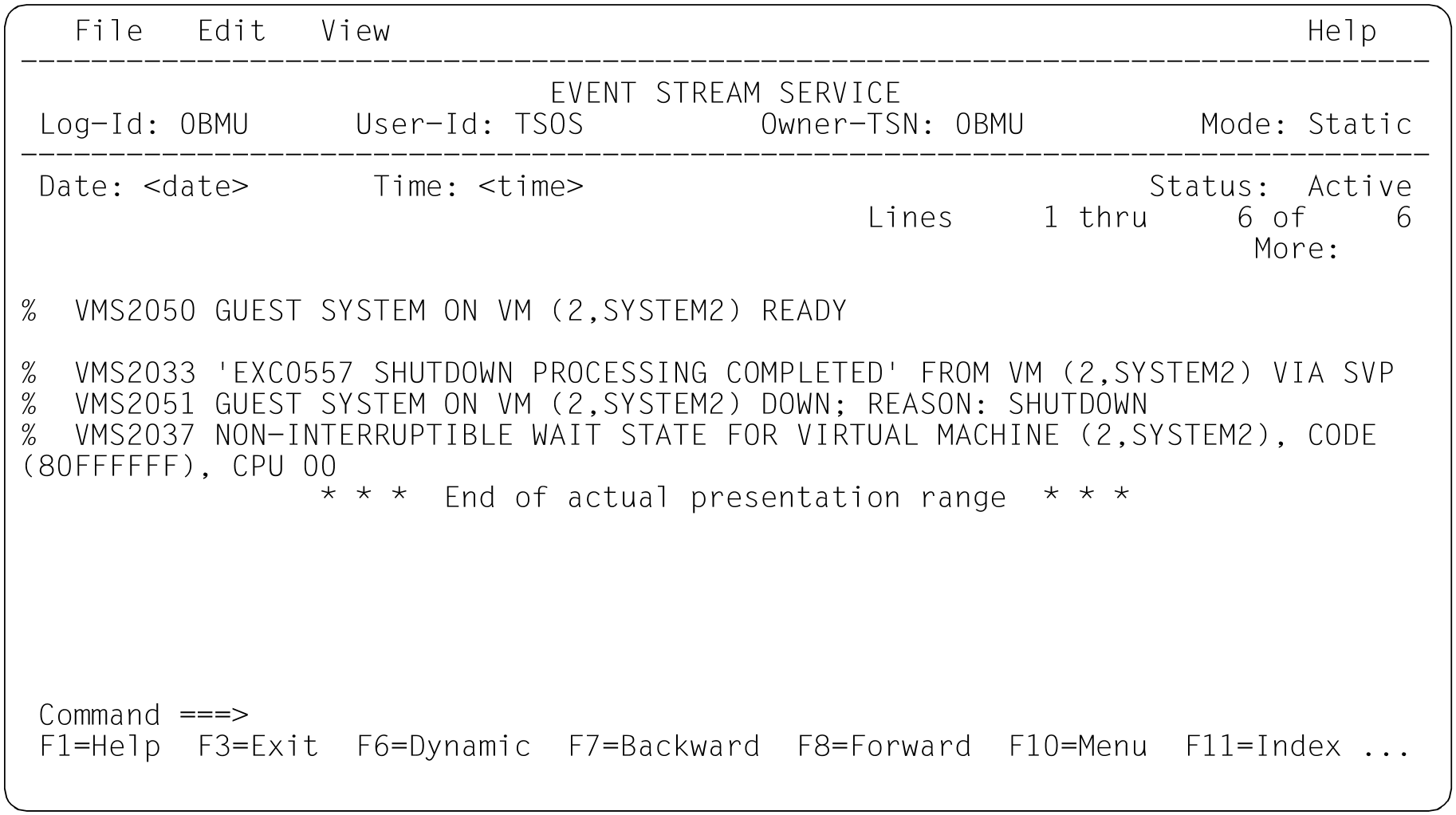This example shows the interaction of BS2000 and VM2000 commands from a privileged user task on an SU /390.
/.vm2adm set-logon-parameters user-id=tsos,logging=*par(listing=*yes) - (1)
/assign-syslst to=list.vm2adm ————————————————————————————————————————— (2) /begin-vm-dialog vm-id=1,password='moni' —————————————————————————————— (3)
/assign-sysevent to=*user-log ————————————————————————————————————————— (4)NBR3100 EVENT STREAM '0CM4' WITH TSN '0CM5' ASSIGNED TO USER TASK '0CM4'/modify-msg-options system-msg=*no ———————————————————————————————————— (5)
/show-vm-resources information=*std ——————————————————————————————————— (6) CPU-POOL(P)VM-ID VM-GROUP(G) CPU-Q MAX-U PROC MEM-SIZE MAX-IO 1 MONITOR *STDPOOL(P) 20.00 100.00 2(+1) 512 (100)VM-ID STATE VERSION PER ADMIN PRIV 1 MONITOR RUNNING V21.0B NO YES AG,ASF R E E VM: 14 LARGEST-DOMAIN(MB): 15344/create-vm memory-size=512,vm-name=system2,cpu-quota=30, processor=*mono,vm-index=2,password=c'sys2' ———————————————— (7)VMS3050 VIRTUAL MACHINE (2,SYSTEM2) CREATEDVMS4615 VIRTUAL MACHINE (2,SYSTEM2) ASSIGNED TO CPU POOL '*STDPOOL'/add-vm-devices units=990f,vm-id=system2,type=*sd ————————————————————— (8)VMS4005 DEVICE '990F' ASSIGNED TO VIRTUAL MACHINE (2,SYSTEM2) (TYPE=SD)/add-vm-dev units=(ch,ci),vm-id=system2 ——————————————————————————————— (9)VMS4005 DEVICE ’CH’ ASSIGNED TO VIRTUAL MACHINE (2,SYSTEM2)VMS4005 DEVICE ’CI’ ASSIGNED TO VIRTUAL MACHINE (2,SYSTEM2)/add-vm-devices vm-id=system2,
units=*pubset-devices(pubset=*by-pubres-device(unit=fc1a)) ——————— (10)VMS4005 DEVICE ’FC1A’ ASSIGNED TO VIRTUAL MACHINE (2,SYSTEM2)VMS4005 DEVICE ’FC1B’ ASSIGNED TO VIRTUAL MACHINE (2,SYSTEM2)VMS4220 PUBSET ’4IVK’ WITH PUBRES DEVICE ’FC1A’ ASSIGNED TO VM (2,SYSTEM2)/start-vm ipl-unit=fc1a,information-byte=*fast,vm-id=system2 —————————— (11) /show-vm-attributes information=*all,vm-id=system2 ——————————————————— (12) CPU-POOL(P)VM-ID VM-GROUP(G) CPU-Q MAX-U PROC MEM-SIZE MAX-IO 2 SYSTEM2 *STDPOOL(P) 30.00 100.00 1(+1) 512 (100)VM-ID STATE VERSION PER ADMIN PRIV 2 SYSTEM2 RUNNING NO NO AS ————————————————————— (13)VM-ID CPU-POOL GR-CPU-Q CPU-Q/ EFF-Q MAX-U/ EFF-U PROC 2 SYSTEM2 *STDPOOL 30.00/ 25.00 100.00/ 25.00 1(+1)VM-ID SCHED ACT-I VIRT CPUS 2 SYSTEM2 DC NO 00(RUN),01(OFF) ————————————————————————————— (14)VM-ID VM-MONJV 2 SYSTEM2 NO VM-MONJV ASSIGNED ————————————————————————————————————— (15)VM-ID UNITS 2 SYSTEM2 ASSIGNED BY VM-ADMIN ————————————————————————————————————— (16) EXCL: CH,CI,FC1A,FC1B SHARED: 990FVM-ID LOC-BEGIN MEM-SIZE MIN-MEM-S MAX-MEM-S DEST-MEM-S 2 SYSTEM2 00000210 512 512 ——————————————————————————— (17)VM-ID PRIV DETAILS 2 SYSTEM2 AS ——————————————————————————————————————————————————————— (18)/show-vm-attributes information=*std,vm-id=system2 CPU-POOL(P)VM-ID VM-GROUP(G) CPU-Q MAX-U PROC MEM-SIZE MAX-IO 2 SYSTEM2 *STDPOOL(P) 30.00 100.00 1(+1) 512 (100)VM-ID STATE VERSION PER ADMIN PRIV 2 SYSTEM2 RUNNING V20.0B NO NO AS ————————————————————— (19)
/shutdown-vm vm-id=system2,action=*shutdown(quiet-time=0) ————————————— (20)VMS2054 SHUTDOWN OF GUEST SYSTEM ON VM (2,SYSTEM2) INITIATED/show-vm-attributes information=*std,vm-id=system2 CPU-POOL(P)VM-ID VM-GROUP(G) CPU-Q MAX-U PROC MEM-SIZE MAX-IO 2 SYSTEM2 *STDPOOL(P) 30.00 100.00 1(+1) 512 (100)VM-ID STATE VERSION PER ADMIN PRIV 2 SYSTEM2 DOWN V20.0B NO NO AS ————————————————————— (21)
/delete-vm vm-id=system2 —————————————————————————————————————————————— (22) VMS4009 DEVICE 'CH' REMOVED FROM VIRTUAL MACHINE (2,SYSTEM2)VMS4009 DEVICE 'CI' REMOVED FROM VIRTUAL MACHINE (2,SYSTEM2)VMS4009 DEVICE '990F' REMOVED FROM VIRTUAL MACHINE (2,SYSTEM2)VMS4009 DEVICE 'FC1A' REMOVED FROM VIRTUAL MACHINE (2,SYSTEM2)VMS4009 DEVICE 'FC1B' REMOVED FROM VIRTUAL MACHINE (2,SYSTEM2)VMS4619 VIRTUAL MACHINE (2,SYSTEM2) REMOVED FROM CPU POOL '*STDPOOL'VMS4024 VIRTUAL MACHINE (2,SYSTEM2) TERMINATED/show-sysevent-log ———————————————————————————————————————————————————— (23)
/end-vm-dialog————————————————————————————————————————————————————————— (24)
/assign-sysevent to=*dummy————————————————————————————————————————————— (25)/assign-syslst to=*primary/print-document from-file=list.vm2adm—————————————————————————————————— (26)
/logoff system-output=*delete—————————————————————————————————————————— (27)
------------------------------------------------------------------------------------------------------------------
(1) | Login with a privileged user ID in the monitor system (VM2000-ADMINISTRATION privilege). The process is to be logged. |
(2) | A BS2000 command is entered to control the logging. |
(3) | Login as VM2000 administrator by opening an ADMIN dialog with the monitor VM. |
(4) | This BS2000 command assigns the user task a user event stream. From this time, asynchronous messages from VM2000 to the VM2000 administrator are logged in the assigned user event stream. |
(5) | The asynchronous messages are only to appear in the user event stream; they are not to be output additionally to SYSOUT. |
(6) | The VM2000 administrator requests the status of VM2000. |
(7) | A mono-VM is initialized by the VM2000 administrator. The VM receives the VM name |
(8) | The VM2000 administrator assigns VM2 a disk device for shared use with other VMs. |
(9) | The VM2000 administrator assigns VM2 a KVP console device pair. |
(10) | The VM2000 administrator assigns VM2 the disk device(s) of the home pubset by specifying the pubres device. The pubset is detected by VM2000. |
(11) | The VM2000 administrator starts the guest system on VM2. The pubres device of the home pubset is selected as the IPL unit. A fast startup is to be executed. Operation of the guest system is carried out on a BS2000 console of the guest system. |
(12) | The VM2000 administrator requests the attributes and status of VM2. |
(13) | The attributes of the VM2 is output. The VM is running; a VM administrator is not connected. The BS2000 version in the guest system is (still) unknown. |
(14) | The virtual CPU |
(15) | No MONJV is assigned to the VM. |
(16) | List of the mnemonic device names that are explicitly assigned to the VM2. |
(17) | The main memory size and the location of the VM in the VM2000 main memory are output. |
(18) | The VM has the (default) privilege |
(19) | The guest system on VM2 has now reached |
(20) | The VM2000 administrator initiates the shutdown for the guest system on VM2 without a QUIET time. |
(21) | After shutdown, VM2 is in the |
(22) | VM2 is terminated by the VM2000 administrator. |
(23) | The presentation function of the event stream service (ESS) is called. The asynchronous messages which have arrived for the VM2000 administrator are displayed. |
(24) | The VM2000 administrator terminates his/her ADMIN dialog with the monitor VM. |
(25) | The assignment of the user event stream to the user task is canceled. |
(26) | The SYSLST assignment is canceled and the session log is printed out. |
(27) | The user task is terminated and the output of SYSLST is suppressed. |

